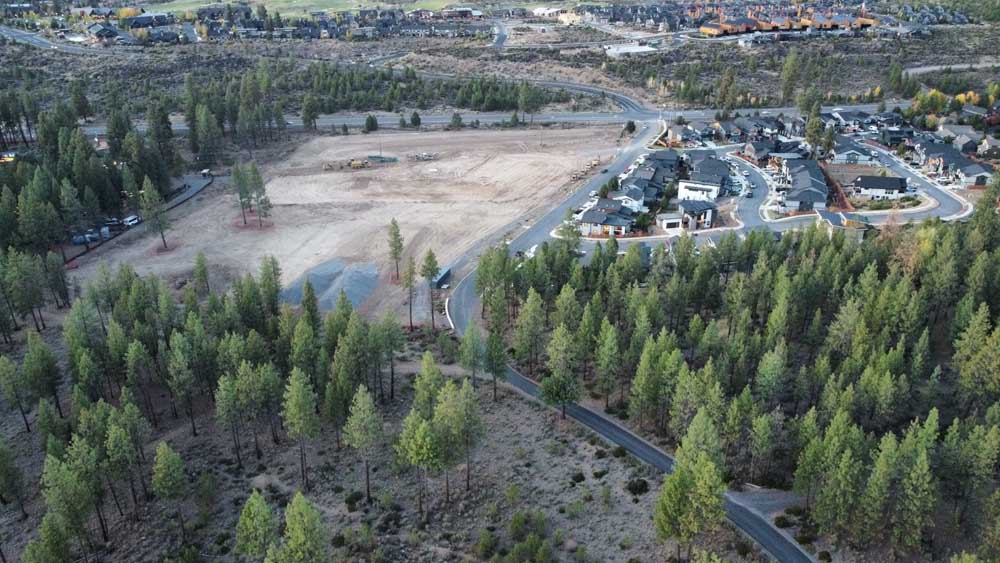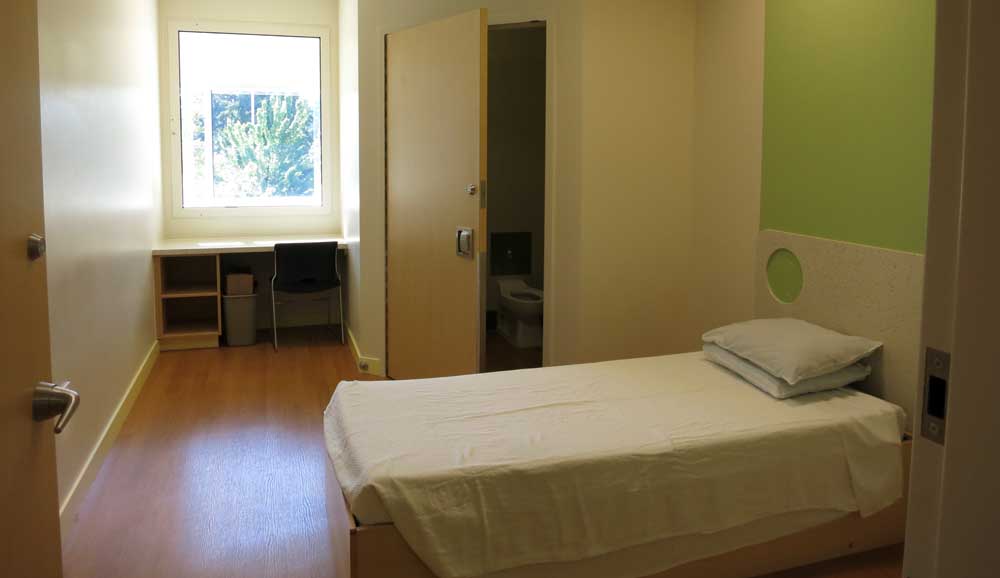Housing demand puts more west side ponderosas at risk
Published 5:45 am Wednesday, January 3, 2024

- More than 100 single-family homes are planned for a 22-acre area of undeveloped land along Bachelor View Road, including the area with trees in the bottom right of this drone photograph. The homes would be built by developer Larry Kine and will be priced between $875,000 and $1.1 million. The area of cleared land in the upper left of the photo is for a 9.9-acre subdivision known as the Lodges at Bachelor View West.
In October, a 10-acre parcel of land on Bend’s west side was cleared of trees to make way for a luxury housing development. Now, plans are moving forward to clear trees from an even larger slice of forested land next door.
More than 100 single-family homes are planned to be built on 22 acres of undeveloped land along Bachelor View Road, according to real estate developer Larry Kine, the developer of the properties.
Trending
Homes will be priced between $875,000 and $1.1 million.
The project will be carried out in multiple phases over several years. Tree clearing and development are expected to begin in the first quarter of 2024.
“On the first phase that we are doing, there is massive grading going on there. So there will be very few trees that will be left on that parcel,” said Kine.
Deforestation to build homes in Bend continues even as the City Council considers adopting a tree code to keep more of the city’s urban canopy intact. Even if a tree code is adopted this year, the rules won’t apply to already approved projects.
Scores of ponderosa pine trees, some of them a century or more old, dominate the soon-to-be-developed lots that line Bachelor View Road. Aspens, firs and junipers are also in the development. They lie in one of Bend’s most forested neighborhoods, with 38% of the area covered in trees, compared to 26% for the entire city, according to Google’s Environmental Insights Explorer tool, which maps tree canopy.
First phase clearing
Trending
The most intense clearing is expected in the initial phase. Kine plans to move slowly on development and said it could take up to six years to complete construction on all 114 lots.
Preliminary grading and tree removal plans reviewed by The Bulletin indicate most trees will be removed. A handful of trees have been identified for preservation by Sun Country Engineering & Surveying Inc., the firm that developed the grading plans. They were identified as not being in the way of any planned development.
In place of the trees, Kine said he intends to build a community with varying home styles constructed by different builders to increase architectural diversity.
While the multiphase project could help alleviate Bend’s housing pinch, the risk of losing more trees cannot be ignored.
Green spaces and trees are recognized as offering environmental benefits to communities by improving air quality, lowering temperatures in cities, retaining snowpack and offering cover for wildlife. They also help in the fight against climate change through carbon sequestration, the removal of carbon dioxide from the atmosphere by plants.
Trees are also good for human wellness. According to the National Institutes of Health, exposure to trees and green spaces is linked to improved mental health, reduced stress levels, reduced loneliness, lower all-cause mortality and lower rates of obesity and chronic diseases.
Rural character
Converting lots with trees to those with houses will also impact the area’s rural character, said Tim Phillips, a resident of the Bachelor View Road area.
“It’s incredibly unfortunate to lose trees, but this is what happens when you have a city that is so tilted to aggressive growth,” said Phillips. “There is no balance. It’s painful to see hundreds of trees chopped down.”
Cort Buchholz, another resident living close to Kine’s property, said he and other area residents met with Kine in 2021 and 2022 to discuss buying some of the available real estate to develop into a park but talks broke down. Neighbors continue to push for tree preservation, but Buchholz remains concerned few trees will be saved.
“I would be surprised, honestly, if he does keep any of them really,” said Buchholz. “He seems at this point just to be interested in maximizing the amount of homes.”
Residents have turned to the Bend Park & Recreation District for assistance in bringing a community park to the area that could save trees but the district has declined, saying there is no need for any additional parkland in the area, and no additional public trail needs.
“As an agency, BPRD prioritizes our efforts, and we’re currently focused on parts of town that serve the highest density of people or will serve the highest densities in the near future,” said Julie Brown, a spokesperson for the district, using the initials of the park district.
Kine argues that none of the trees on his land in the area qualify as old growth and the area was intensely logged in the early 1900s. He counters that increasing the housing stock will benefit the environment by allowing more people to live close to where they work, thereby reducing commutes and carbon emissions.
“To create more housing in Bend where people want to live instead of needing to commute, that is the most environmental thing we can do,” said Kine.
Kine’s other ventures in Bend include housing developments and an RV Park on the city’s south side. He has built affordable housing on Bend’s east side, but his newest project along Bachelor View Road doesn’t include affordable units.
Pending litigation
Before Kine can break ground, some legal issues still need to be ironed out. The Bachelor View Road developments have spawned multiple court cases with one resolved but two still active.
One of the cases saw Bachelor View Road residents file a suit against Kine for ignoring livability standards in the area. That one has largely been resolved, with Kine agreeing to install a gate south of his property to increase privacy for homes close to the Deschutes River.
Kine also agreed to reduce housing density and will leave a strip of undeveloped land near the road.
Another lawsuit filed by Bachelor View Road residents is not with Kine, but instead with the city of Bend. The road that divides Kine’s properties is private and the homeowners who jointly own it say easements were unlawfully taken or terminated by the city without notification to the owners of the easements.
“The taking of the easements benefits the developer and the small number of people buying the lots or the homes,” said Buchholz, one of the plaintiffs in the suit. “If the developer were installing some space such as a park for public use, an argument could be made that the city took our easements to those ends, but that is in no way the case.”
Michael Selkirk, an attorney for the city, declined to comment on the dispute because the case is ongoing.
Kine can’t proceed with his building plans until the city and the homeowners can work out the legal entanglement. An agreement on these cases would greenlight home building for Kine.
“The only issues left are with the homeowners and the city of Bend,” said Kine. “I don’t know if that will fall apart between those two parties, but I have agreed to everything that they wanted me to do.”








